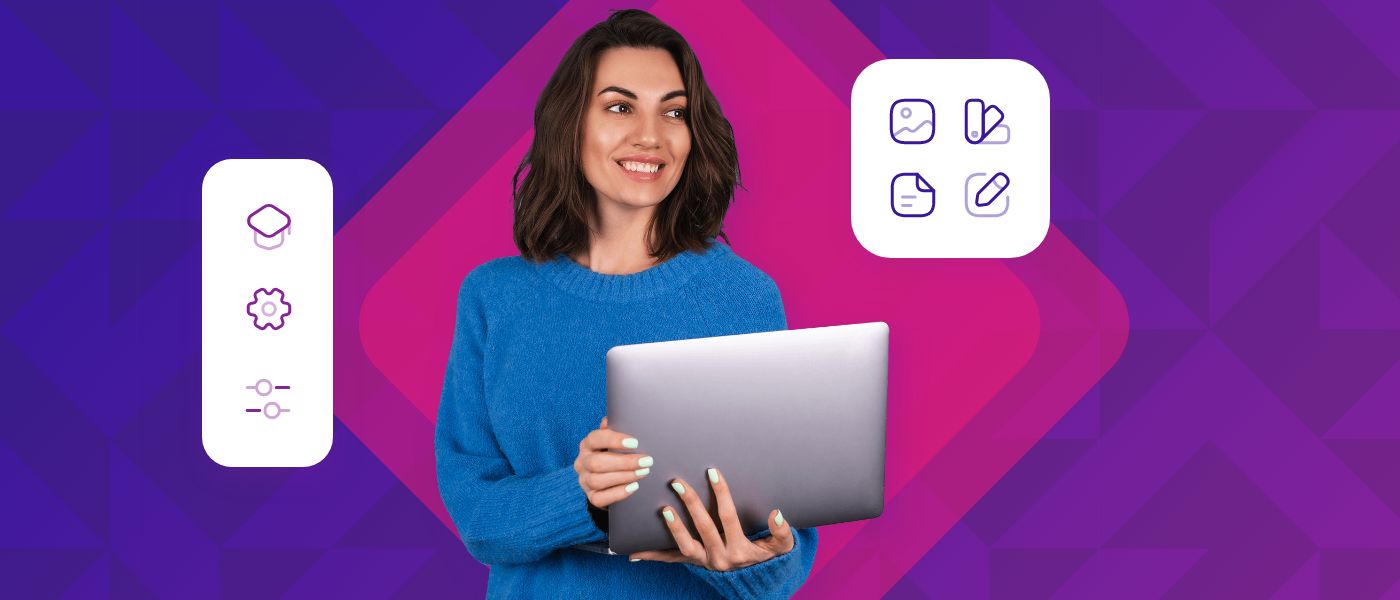
WHITEPAPER
How to take your in-person training online with the right authoring tool
October 25, 2023

Table of contents
In the digital age, online education has become a fundamental pillar of training for professionals and students around the world. E-learning platforms play a particularly important role in this process, since they make it possible for students to learn through electronic devices, breaking down former barriers such as time or distance.
If you’ve recently entered the world of e-learning, you’ll probably have come across these two acronyms: LMS and LCMS. Both tools play an essential role in managing and delivering learning content, but come with key differences that can determine which solution is best for your needs. In this article, we’ll explore the difference between LMS and LCMS, and take a look at how each can enhance your e-learning experience.
In the world of e-learning, choosing the right platform can make all the difference in both the effectiveness and success of your online training strategy. Two of the most common options available are LMS (Learning Management Systems) and LCMS (Learning Content Management Systems). Although both have an educational purpose, they feature fundamental differences that you should understand before deciding which one to use.
Let’s start by getting clear on what an LMS (or learning management system) is. Put simply, it is a platform that allows the complete administration, distribution and management of the online learning process. Therefore, its main function is to provide a digital space where courses and modules can be organized, managed and distributed to students.
Although they share similarities, LCMS or learning content management systems are platforms that focus more on the creation and management of learning content. They are platforms designed to let you create and store elements such as modules, resources and learning objects, which can then be shared and reused across various courses. In LCMS, the priority is the development and maintenance of high-quality educational content.
LMS’s are designed for managing and tracking student progress in existing courses. They allow data exchange between students and those in charge of training, ensuring that learning can be monitored.
These systems can analyze the results of any training carried out, both in terms of the success of a whole course and the individual performance of each student. To achieve this, they feature tools that allow you to create reports, or build a dashboard to comprehensively monitor the training project.
In contrast, LCMS’s focus on the creation and management of learning content. They allow you to create personalized and reusable educational material, which saves time and resources when it comes to creating larger courses or modules.
Generally LMS’s serve to distribute or disseminate existing educational material, focusing on the learning process rather than content creation. These systems ensure that learning is consistently available to students, assisting you with planning and managing their performance.
Unlike LMS’s, LCMS’s do not focus on distribution but rather on the creation of material in the first place. These systems come with features that allow you to manage the content creation process, and also reuse or optimize that content later down the line.
Collaboration in an LMS focuses on communication between students and teachers through forums, chats, and discussion tools. These valuable features encourage online interaction, as well as allow you to customize the user interface or create predefined learning paths. Both measures make it easier for students to progress at their own pace and enjoy training adapted to their individual needs.
Due to their content-centric nature, LCMS’s provide advanced tools for content customization. Using them, instructional designers can easily create and adapt educational materials to meet the specific needs of students.
In terms of collaboration, an LCMS offers tools that facilitate collaboration between students or even teachers themselves, allowing for the joint creation of learning content – something especially beneficial in team learning environments.
LCMS’s play a vital role in modern education and are an invaluable tool for educational institutions, businesses and organizations looking to take their online learning experience to the next level.
One of their greatest benefits is the easy and efficient creation of educational content. LCMS’s provide intuitive tools for exactly this purpose. In addition, they make it possible to reuse and share any created learning objects, which saves both time and resources.
Choosing between an LMS and an LCMS will depend on your specific goals and needs. If you’re looking for a more complete platform that allows you to manage and optimize your training, then an LMS is the ideal option.
In fact, with isEazy LMS you’ll be able to comprehensively manage all your training, communication and corporate knowledge processes in one place. Offer your employees a unique learning experience with a user-focused LMS that gives you everything you need to manage and optimize your training projects. Request a demo!
From videos, PDF documents, and presentations to SCORM courses, interactive assessments, podcasts, or surveys. An LMS is designed to centralize all your training materials in a single environment, facilitating access and organization.
An LCMS enables quick and efficient course creation, ensures consistency across content, and supports real-time collaboration among educators and instructional designers. It makes it easy to update and repurpose existing materials, which enhances the management of knowledge resources. Furthermore, it offers a variety of multimedia and interactive tools that make learning experiences more engaging, and it integrates seamlessly with an LMS for automatic content distribution.
Yes, most modern LMSs allow integration with other systems you already use in your company, such as HR platforms, communication tools, or corporate calendars. This allows centralized management and avoids duplication. Some LMSs even offer APIs or preconfigured integrations with software like SAP, Microsoft Teams, or Slack, making implementation even easier.
An LCMS (Learning Content Management System) is a specialized platform designed to streamline the creation, organization, storage, and reuse of educational content. Think of it as a collaborative workspace where trainers, instructors, and subject matter experts come together to craft courses and learning materials with consistency in both teaching methods and visual presentation. It also works hand-in-hand with LMS platforms to efficiently deliver this content to learners.
The fundamental distinction is in their primary functions. An LMS (Learning Management System) is all about managing the delivery of training—tracking enrollments, monitoring learner progress, and generating reports. On the flip side, an LCMS zeroes in on the content creation and management aspect. While an LMS focuses on “how” training is delivered, an LCMS deals with “what” the training content is, making it a go-to solution for organizations that need to produce a lot of educational materials.
WHITEPAPER
LMS is Evolving...
Learn how to improve the training experience in your company with an LXP
Download whitepaper



